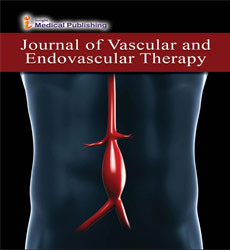Vasculitis: Insights into Blood Vessel Inflammation Disorder and its Impact on Health
Alessandra Ferrari
Department of Cardiovascular Medicine, University of Padua, Padua, Italy
Published Date: 2024-06-13DOI10.36648/2634-7156.9.3.196
Alessandra Ferrari*
Department of Cardiovascular Medicine, University of Padua, Padua, Italy
- *Corresponding Author:
- Alessandra Ferrari
Department of Cardiovascular Medicine, University of Padua, Padua,
Italy,
E-mail: aferrari@gmail.com
Received date: May 13, 2024, Manuscript No. IPJVES-24-19479; Editor assigned date: May 16, 2024, PreQC No. IPJVES-24-19479 (PQ); Reviewed date: May 30, 2024, QC No. IPJVES-24-19479; Revised date: June 06, 2024, Manuscript No. IPJVES-24-19479 (R); Published date: June 13, 2024, DOI: 10.36648/2634-7156.9.3.196
Citation: Ferrari A (2024) Vasculitis: Insights into Blood Vessel Inflammation Disorder and its Impact on Health. J Vasc Endovasc Therapy Vol.9 No.3: 196.
Description
Vasculitis is a group of disorders characterized by inflammation of the blood vessels. This inflammation can affect arteries, veins, or capillaries, leading to a range of symptoms and potentially serious health complications. Early diagnosis and treatment are vital for symptom management and the prevention of long-term damage. The impact of vasculitis varies depending on the size and location of the affected vessels and the severity of the condition. This overview provides a detailed look into vasculitis, including its types, symptoms, diagnosis and treatment. Vasculitis is categorized based on the size of the blood vessels involved and whether it affects small, medium, or large vessels. Large vessel vasculitis affects large arteries such as the aorta and its major branches. Common examples are Giant Cell Arteritis (GCA) and takayasu arteritis. GCA primarily affects the arteries in the head, causing headaches and visual disturbances, while takayasu arteritis commonly affects the aorta and can lead to reduced blood flow to the arms and legs. Medium vessel vasculitis targets medium-sized arteries and includes conditions like Poly Arteritis Nodosa (PAN) and kawasaki disease. PAN can affect organs such as the kidneys and heart, leading to symptoms like abdominal pain and hypertension.
Kawasaki disease, more common in children, involves inflammation of coronary arteries and can lead to heart complications. Small vessel vasculitis affects tiny blood vessels such as capillaries. Examples include Granulomatosis with Poly Angiitis (GPA, formerly Wegener's Granulomatosis), Microscopic Poly Angiitis (MPA) and Henoch-Schönlein Purpura (HSP). These conditions can impact organs like the lungs, kidneys and skin, leading to symptoms ranging from skin rashes to kidney failure. The symptoms of vasculitis can vary significantly depending on the specific blood vessels affected and the severity of the inflammation. Commonly observed symptoms include fever, which indicates systemic inflammation and general fatigue characterized by persistent tiredness and weakness. Unexplained weight loss can also occur as the body responds to inflammation. Additionally, patients may experience muscle and joint pain due to the inflammatory process affecting these areas. Skin changes are another common symptom, presenting as rashes, ulcers, or bruising. The condition may also lead to organ-specific symptoms for instance, if the lungs are involved, respiratory issues might arise, while abdominal pain can be a sign if the gastrointestinal tract is affected.
Diagnosing vasculitis requires a multifaceted approach involving clinical evaluation, laboratory tests, and imaging studies. A thorough medical history and physical examination are essential for identifying symptoms and potential causes. Blood tests are useful for detecting markers of inflammation and assessing organ involvement, with tests like the Erythrocyte Sedimentation Rate (ESR) and C-Reactive Protein (CRP) being commonly employed. A biopsy of affected tissue, such as from an organ or skin lesion, can confirm the diagnosis by revealing inflammation in the blood vessels. Treatment for vasculitis aims to control inflammation, manage symptoms and address underlying conditions. Medications such as corticosteroids are frequently used to reduce inflammation. In some cases, immuno suppressive drugs like methotrexate or cyclophosphamide are prescribed to suppress the immune system and prevent further damage. Managing complications, such as high blood pressure or kidney damage, is vital for effective overall treatment. Additionally, lifestyle adjustments, including dietary changes and avoiding triggers that may worsen the condition, are often necessary for comprehensive care.
Prognosis and follow-up
The prognosis for vasculitis varies based on the type and severity of the disease, as well as the response to treatment. Some forms of vasculitis can be managed effectively with medication, leading to remission and a good quality of life. However, others may result in long-term complications or require ongoing treatment and monitoring. Regular follow-up with healthcare providers is essential to monitor disease activity, manage side effects of treatment and adjust therapies as needed. Early intervention and adherence to treatment plans can significantly improve outcomes and quality of life for individuals with vasculitis. Chronic or severe forms of vasculitis might result in persistent health challenges, necessitating continuous medical intervention. Effective management often involves a combination of medications, such as corticosteroids and immuno-suppressants, along with lifestyle adjustments. Regular follow-up appointments with healthcare providers are vital to assess disease activity, monitor for potential side effects of treatment and make necessary adjustments to the care plan. Vasculitis is a complex group of disorders that can significantly impact health and quality of life. Understanding the various aspects of a condition is essential for effective management.
Open Access Journals
- Aquaculture & Veterinary Science
- Chemistry & Chemical Sciences
- Clinical Sciences
- Engineering
- General Science
- Genetics & Molecular Biology
- Health Care & Nursing
- Immunology & Microbiology
- Materials Science
- Mathematics & Physics
- Medical Sciences
- Neurology & Psychiatry
- Oncology & Cancer Science
- Pharmaceutical Sciences
